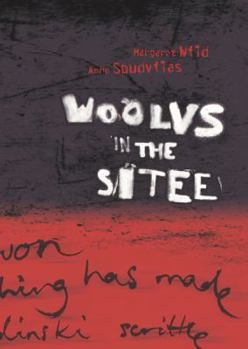Woolvs in the Sitee
In a strange and sinister world, a boy must face his fears alone. Ben is hiding from the "woolvs." He has no family left, and he is running out of food and water. His only ally, Missus Radinski,... This description may be from another edition of this product.
Format:Hardcover
Language:English
ISBN:1590785002
ISBN13:9781590785003
Release Date:September 2007
Publisher:Front Street
Length:40 Pages
Weight:1.20 lbs.
Dimensions:0.4" x 9.0" x 12.4"
Age Range:9 to 12 years
Grade Range:Grades 4 to 7
Customer Reviews
3 ratings
Dark and ambiguous
Published by Thriftbooks.com User , 15 years ago
WOOLVS strikes me as being a work for a mature reader. It's kind of a picture-book for adults, maybe, which makes it an odd in-between sort of thing (and difficult to market, I suspect) but something powerful and memorable, nonetheless. Both the art and the narration are nicely understated, indirect and ambiguous-- skillfully removing or blurring the boundaries between reality and nightmare. Much is left (rightly) to our imagination- but our hero has an imagination, too. Or does he? The world of the story is a bleak one-- Ben, our orphaned narrator, lives in a deserted post-apocalyptic cityscape, social collapse reflected in the desperate misspellings of his narrative. He obsesses, waking and dreaming, over shadowy predators in the empty streets. He tries to warn his only friend and benefactress, Mrs. Radinski, of the approaching danger. Does she really not believe him? The book, working on a lot of levels and leaving much unexplained, has lured me into repeated readings. Apart from a feeling that the ending is one note off, I find Ben's simple voice more affecting and the pictures more suggestive each time I pick it up.
Delightfully Creepy!
Published by Thriftbooks.com User , 16 years ago
This is a wonderful picture book for horror fans of any age -- including adults. The story is apparently about a broken-down society in which food and water have grown scarce, electricity is out, and people are left to fend for themselves. The story is narrated first-person by a teenager named Ben who lives alone in the basement of an apartment building after his family was killed by wolves roaming the city. But these are not ordinary wolves, Ben assures us, leaving me to wonder if he's talking about werewolves. The kindly Mrs. Radinski doesn't believe in any wolves despite Ben's repeated warnings. Then one day she goes missing... Or maybe there are no wolves. Maybe Ben is a mentally ill teenage runaway whose hallucinations have painted a threatening shadow over the peaceful streets and parks he remembers from his childhood. We can't really tell for sure, because Ben is the only narrator we have, and no matter what's really happening, Ben just isn't all there. I've read hundreds and hundreds of picture books, but I've never seen one anything like this. The story is told with a genuine sincerity that is made more powerful by the poor spelling, and the dark sketchy illustrations complement the writing perfectly. I'm not sure who the target audience is, but fans of Neil Gaiman's twisted perspective on horror will love this. Buy it for teenagers or adults, or for anyone old enough to appreciate a good psychological horror story.
Is this the most beautiful children's book children will never read?
Published by Thriftbooks.com User , 17 years ago
Margaret Wild is one of Australia's most successful, imaginative and challenging writers for children, and Woolvs in the Sitee the bravest to date. It is a beautiful and frightening book, with poetic language rich with unsettling imagery and metaphor. It presents a dystopic post-Western world, in which people vanish and `woolvs' prowl. The exact nature of these woolvs is never quite spelt out. Nor, for that matter, is anything else: the most striking aspect of Woolvs in the Sitee is the phonetic spelling that forms the voice of protagonist Ben. The device speaks of his interrupted schooling, the disappearance of his family, and mirrors the collapse of his society. Anne Spudvilas' illustrations are spellbinding, full of shadows and menace, amplifying the unnerving and paranoid atmosphere. The book deserves the awards it has won (and will no doubt win). However, the book is challenging, and I do wonder who the intended readers are. Younger children are not cognitively developed enough to understand the many metaphors and resonances essential to grappling with the text. By the time older children have matured enough to understand the text, they generally reject picture books. To test the theory I ran the book past my three girls. Each reacted quite differently: my six-year-old Dr-Seuss-fan was terrified; my eight-year-old Harry-Potter-freak was bored; and my ten-year-old, who is mid-way through The Lord of the Rings and attempting to translate the Elvish, was badly irritated by the spelling, which she found made it difficult to read physically. In Piagetian terms, the eldest has moved on from concrete to formal logic, but even so, none of my girls was as excited by the book as I was. Likewise, I was unable to persuade any of the three to 'read' past the first page of Shaun Tan's beautiful The Arrival. Is Woolvs in the Sitee then an attempt by adults to push post-modern genre-straddling texts onto children for the children's own good? Is there an intellectual didactic purpose behind its authorship, which is rejected by kids as they reject all preaching? Is the book really aimed at well-meaning, literary parents hoping to broaden their children's minds? These are probably questions which arise whenever children's books break with expectations. It's refreshing to see a child's book that isn't all pastel-pink fairy-floss and no fillings, but my feeling is that Woolvs in the Sitee is possibly too alienating for many of its intended audience.





